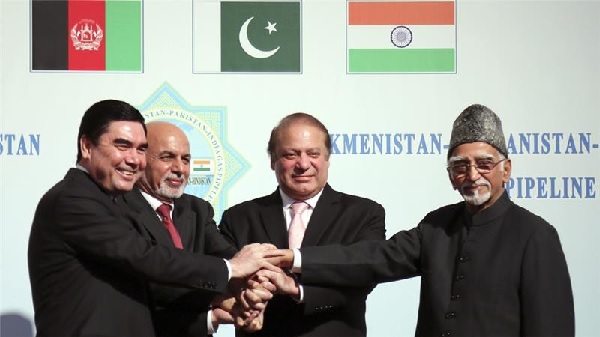By Barnett Rubin
Pakistan could use its influence on Afghan Taliban groups to protect the new TAPI gas pipeline. When – or if – completed, a new natural gas pipeline would carry 33 billion cubic metres of gas from Turkmenistan through three South Asian countries. Pakistan and India would each purchase 42 percent of the gas; the remaining 6 percent would go to Afghanistan. Afghanistan would receive about $400 million per year in transit fees, equal to about 25 percent of the state’s total domestic revenue in 2015.
The project, known as The Turkmenistan-Afghanistan-Pakistan-India natural gas pipeline, or TAPI, would provide energy, and employment. Even more important, it will provide an incentive for Pakistan to cooperate with India and Afghanistan in stabilising Afghanistan.
Helmand security
That was the key question the desperate deputy governor of Helmand, one of the provinces through which TAPI is supposed to run, took to Facebook in a desperate attempt to get President Ashraf Ghani’s attention. “Excellency,” wrote Mohammad Jan Rasulyar, “Helmand is standing on the brink, and there is a serious need for you to come.”
He posted the appeal to the president to focus on the immediate threat while Ghani was in Kabul after trips to Pakistan and Turkmenistan and before trips to Azerbaijan and Turkey, all of which focused on Afghanistan’s long-term needs for energy and trade. The Taliban were advancing on the district centre of Sangin, from where they could stage an assault on the vulnerable provincial capital of Lashkargah. Without the belated intervention of US air power, the province might have fallen. There are many doubts about TAPI: will Turkmen Gas be able to provide the promised 51 percent of financing for the ten billion dollar project? Who will finance the 34 percent that remains uncovered after commitments by Turkmenistan and the other three parties? But serious as these concerns are, security has raised the most questions.
Taliban want its share
TAPI would run through some of the most contested areas of Afghanistan. The Taliban have never opposed TAPI – when they were in power they sent a delegation to the US to investigate the deal – but they want a share of the transit fees. If there is no political solution in the next few years, they could find ways to hold up transmission unless they are paid. The biggest security concern may actually be in Pakistan. Most of the pipeline’s path there traverses the province of Balochistan, the site of a persistent revolt uprising by Baloch nationalists, who regard the distribution of gains from national resources, including natural gas, as one of their central grievances.
Today, however, the rapid growth of the Chinese and Indian economies have created a counter-balance. Indian officials claim that Pakistan orchestrated attacks on workers building the Afghan portion of a road linking the Iranian port of Chabahar to Afghanistan’s highway network through the border town of Milak. Six Indian officials and over a hundred Afghan workers were killed in such attacks between 2005 and 2009.
Pakistan regarded that project, based on Indo-Afghan-Iranian cooperation, as a threat to the strategic leverage it has exercised over Afghanistan through control of the country’s only transit route to the sea, via Karachi. TAPI is different: it commits India and Pakistan to mutually beneficial cooperation in Afghanistan.
If Pakistan could use its influence or control of Afghan Taliban groups to try to sabotage the Indo-Iranian corridor, it could equally use its influence to protect TAPI. Pakistan’s Defense Minister Khwaja Mohammad Asif told BBC Urdu as much, saying that Pakistan would use its influence on the Taliban for the security of TAPI.
The Afghan government denounced this statement as “irresponsible” interference in Afghanistan’s internal affairs and insists that gaining Taliban’s support for TAPI must form part of a political settlement led by the Afghan government rather than a deal between Pakistan and the Taliban. Nonetheless, this dispute shows that in a changed regional environment Afghanistan and Pakistan may have common interests in reducing security threats to TAPI.
Pakistan Army and Balochaistan
Balochistan may pose a more difficult challenge. The Pakistan army has for several years conducted harsh operations to suppress the revolt, leading the hundreds of disappearances of suspected militants or nationalist sympathisers. On December 30, however, in Zhob, Balochistan, Prime Minister Nawaz Sharif inaugurated the western route of the China-Pakistan Economic Corridor, which Baloch had charged would marginalise their province. In his speech at the event, Sharif said, “We believe that Balochistan has the first right over all resources which have been explored in the province.” While this statement contained no specifics, it constituted in principle a major outreach to the Baloch nationalists. Some analysts have rushed to anticipate TAPI’s failure by extrapolating the past into the future. No one ever damaged his or her reputation by being pessimistic about Afghanistan.
But it is also possible that a transformation is underway. Forty years ago, Southeast Asia was devastated by war and genocide, but international cooperation, plus the economic dynamism of East Asia, transformed it. TAPI is one of many steps aimed at putting Southwest Asia on a comparable path.
‘Courtesy Al Jazeera’.


